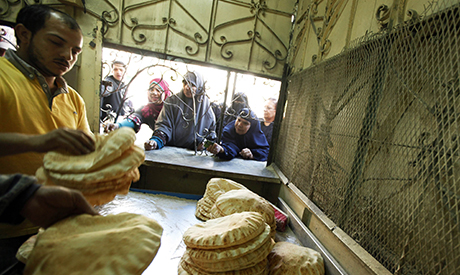
People queue for subsidised bread at a bakery equipped with a smart card system in the Suez Canal city of Port Said, 170 km (106 miles) northeast of Cairo, February 24, 2014 (Photo: Reuters)
The Egyptian government will implement a new food subsidy system within three months starting with a pilot project that will be implemented in Port Said next month. Supply minister, Khaled Hanafi announced that he is going to modify the food subsidy system in order to widen the range of goods offered to consumers.
The new system will also fix a limit for bread use per person that will be controlled through smart cards.
The new system resembles a cash transfer system as each smart subsidy card will include a certain number of points related to the number of family members and each commodity will be worth a certain number of points.
Currently, holders of subsidy cards have the right to a monthly amount of cooking oil, sugar and rice while there is no restriction on the amount of subsidised bread.
“People will be allowed to choose from a larger range of products like milk, fruits and vegetables according to each family's needs," said ministry spokesperson Mahmoud Diab.
“If a family's needs for bread for example are below the fixed amount, it can use the difference of points to meet other needs for free,” he added.
To implement the new system, the government has to finalize the introduction of smart cards; a program launched under Mubarak in order to liberalise flour prices.
According to Diab, only 500,000 familes out of 18.2 million holding subsidy cards still use the old paper card. The liberalisation of flour prices used for subsidised bread will take less than three months.
The government is adopting a previous plan announced in March 2013, under ousted President Mohamed Morsi, according to which it will continue to subsidise bread loaves, but not flour – which would henceforth be sold to bakeries at market prices. The move means that prices paid by bakeries for a 100-kilogram bag of flour would rise from LE16 to LE286.
The government will then purchase loaves of bread from bakeries for 34 piastres each before selling them to consumers at 5 piastres each.
“The new system will reduce fraud and thus bread subsidies," adds Diab.
The government has often accused bakeries of selling subsidised flour on the black market rather than using it to produce bread.
Local bread prices have remained unchanged since the 1980s due to a policy of frequent government intervention to stabilise subsidised bread prices. Until now, the local price for a loaf of bread remains about 5 piastres.
Food subsidies are expected to cost LE32 billion ($4.5 billion) in 2013/14 with more than two thirds of the amount going to bread subsidies.
In recent years, several government's plans to modify food and fuel subsidy systems were reportedly postponed.
Short link: